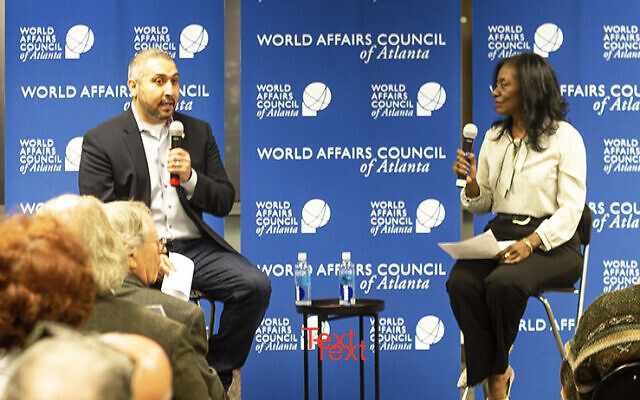Security Consultant Describes New War on Web
America is in a worldwide war, but it’s not a traditional war on a traditional battlefield, according to cybersecurity expert James Azar.

America is in a worldwide war, but it’s not a traditional war on a traditional battlefield. It’s an information war that is being fought electronically on the internet. The outcome could help to shape the future of American democracy just as certainly as a war with tanks and guns.
That was the message at a recent program featuring cybersecurity expert James Azar, sponsored by the World Affairs Council of Atlanta of Georgia State University. Azar, who grew up in a Sephardic family with roots in the Middle East’s old Turkish Ottoman Empire, is a security consultant in Atlanta.
“We’re in a place where we’ve never been before. We’re in uncharted waters,” he told members of the Georgia State forum, “and when we’re in uncharted waters, we tend to make mistakes. There are casualties in the process and losses in that process. And we’re in the midst of that right now.”
The war he describes affects almost anyone who uses communication technologies of choice in America – computers and smartphones. They put almost every nook and cranny of our country within reach of those nations whom Azar believes have long-range plans to discredit the American way of life and our ability to think freely and clearly.
“The people who want to sow discord and create this level of division in our population are long-term players,” he pointed out “and they are predominantly the two largest nation states that have a problem with America. They happen to be China, number one, and Russia, number two.”
The allies of these two nations, according to Azar, are the major social media platforms such as Facebook, Twitter, Google and Instagram, which make huge profits from distributing content that is deliberately false and misleading. Anyone with an internet connection, including an army of disinformation specialists in countries that are our adversaries, can use social media with little or no restraint.
“They create fake websites. They create all kinds of fake characters, fake bots online that will engage with subsets of the population,” Azar maintains. “Today anyone can be a blogger or a journalist. Anyone can put up a website. I can start sowing discord. I can spread misinformation and neither Facebook nor Twitter nor Instagram or Snatchat can stop it.”
According to two distinguished professors at Cornell University, Glenn Altschuler and Sidney Tarrow, the Telecommunications Act of 1996 gives social media corporations the right to disseminate information they know to be false and profit from it, if they don’t endorse it.
They wrote on the online publication, The Hill, “This could range from simple misinformation, to bots, to fully-synthetic ‘deep fakes,’ videos constructed with artificial intelligence to make real people seem to be doing or saying things they never would in real life.”
The result, according to Azar, is that ideas no longer drive political partisanship. Partisanship forms a stronger bond than political ideas, even if it has no basis in truth or reality.
“Now, these characters and these fake personalities are getting thousands, if not millions, of followers. And the Chinese are very good at emulating human behavior,” he says. “They are at the forefront of artificial intelligence. There are said to be 30,000 Chinese individuals that work in different provinces within China in what they call cyber farms based out of specific universities. The Russians do the same thing as well.”
If we are not to fall victim to even more insidious manipulation by foreign governments and their legion of media manipulators, Azar believe we must be more vigilant. He cautions that we should not believe everything we see on social media and on the web.
Ultimately, he feels that our government will be forced to step in, even though there has been strong resistance to doing so in both Congress and in the Trump administration.
One of the easiest measures he believes that our government can do now, Azar suggests, is to regulate who buys domain names. He urges a system that would require website addresses be registered to Americans who can offer ironclad guarantees to their identity.
“You’d get rid of probably 80 percent of the fake web,” Azar said.



comments